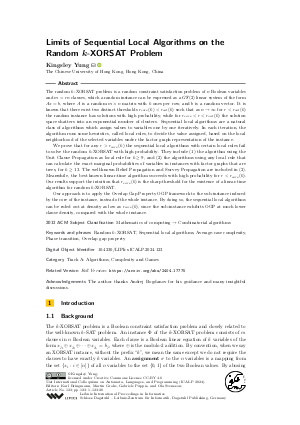@InProceedings{yung:LIPIcs.ICALP.2024.123,
author = {Yung, Kingsley},
title = {{Limits of Sequential Local Algorithms on the Random k-XORSAT Problem}},
booktitle = {51st International Colloquium on Automata, Languages, and Programming (ICALP 2024)},
pages = {123:1--123:20},
series = {Leibniz International Proceedings in Informatics (LIPIcs)},
ISBN = {978-3-95977-322-5},
ISSN = {1868-8969},
year = {2024},
volume = {297},
editor = {Bringmann, Karl and Grohe, Martin and Puppis, Gabriele and Svensson, Ola},
publisher = {Schloss Dagstuhl -- Leibniz-Zentrum f{\"u}r Informatik},
address = {Dagstuhl, Germany},
URL = {https://drops.dagstuhl.de/entities/document/10.4230/LIPIcs.ICALP.2024.123},
URN = {urn:nbn:de:0030-drops-202666},
doi = {10.4230/LIPIcs.ICALP.2024.123},
annote = {Keywords: Random k-XORSAT, Sequential local algorithms, Average-case complexity, Phase transition, Overlap gap property}
}

 Creative Commons Attribution 4.0 International license
Creative Commons Attribution 4.0 International license


